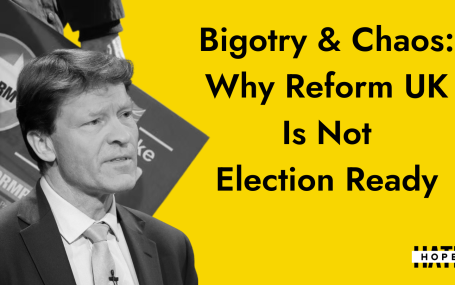HOPE not hate uses cookies to collect information and give you a more personalised experience on our site. You can find more information in our privacy policy. To agree to this, please click accept.
In this special section, we profile 11 highly-effective projects, organisations and individuals which have all had a major impact in tackling Islamophobia.
Some have done so with effective memes. Others have worked closely with government. Some detail long-term and patient community-level work, helping to transform attitudes in often divided towns and cities across Europe and the USA.
All have in common that they are breaking down stereotypes, penetrating the layers of hatred that surround Muslims and Islam at the moment, showing the importance of building alliances (sometimes in surprising areas), getting local communities on-side, targeting the right narratives, and mixing both online with offline activities.
Anti-Muslim prejudice has “passed the dinner table test” in the UK. That was what former UK Minister of State for Faith and Communities, Baroness Warsi, said seven years ago.
Today, anti-Muslim hatred remains more socially acceptable than ever, and is often spurred by certain groups in the media and political spectrum.
After the terror attacks last year, Islamophobic incidents rose sharply: the Home Office reported a five-fold increase following the Manchester attack and a two-fold rise after the London Bridge atrocity.
The spikes include attacks on mosques, physical and verbal abuse against Muslims, anti-Muslim graffiti and online hate.
Between May 2013 and June 2017 there was on, an average, one incident a week against a mosque. This all takes place against a backdrop of a 23% rise in religious and race-related hate crimes in the 11 months following the Brexit vote, according to figures from police forces released after a Freedom of Information request.
There has been an “intensification and banalization of Islamophobic sentiment, policy and practice in Britain” according to a landmark report produced by the Runnymede Trust, Islamophobia: Still a Challenge for Us All.
Our own Fear & HOPE 2017 poll revealed that fears are becoming more targeted towards Muslim communities.

42% of English people say that they are now more suspicious of Muslims as a result of the London and Manchester terrorist attacks. Attitudes towards Muslims and Islam have worsened overall, particularly among the more hostile sections of society.
There is a sizeable percentage of the population (52%) which believes that Islam poses a serious threat to Western civilisation, although this percentage has decreased by 4% since 2016.
A quarter of English people also believe that Islam is a dangerous religion that incites violence, and among the most hostile identity ‘tribe’ of the poll, seven out of 10 agree.
In response to these challenges, Muslim communities are currently undergoing a transformational change in how they manage and reduce impacts of anti-Muslim hatred.
Citizen journalism and the recording of anti-Muslim hate incidents, as well as the pro-active use of social media, reflect younger Muslims within communities who are confident to challenge hatred where they find it.
| Terminology The Runnymede Trust sets out an updated definition for the term Islamophobia, defining it as:“Any distinction, exclusion, or restriction towards, or preference against, Muslims (or those perceived to be Muslims) that has the purpose or effect of nullifying or impairing the recognition, enjoyment or exercise, on an equal footing, of human rights and fundamental freedoms in the political, economic, social, cultural or any other field of public life”. |

HOPE not hate reveals ANOTHER shameful Reform UK candidate – and lifts the lid on the party’s chaotic selection process UPDATE: Reform UK has DROPPED…